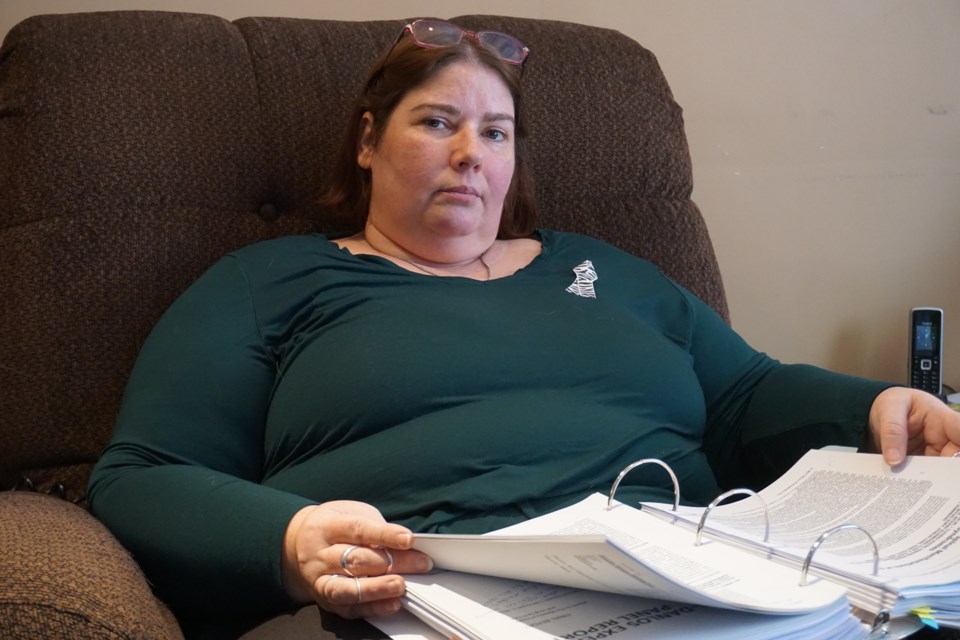Tammy Stadt never thought she’d experience nearly four years of physical pain and emotional turmoil while dealing with the healthcare system she so firmly believed in.
The Midland resident, who is on long-term disability from her job as a community health worker with the Barrie Community Health Centre, is truly frustrated in her quest to have her debilitating illness properly treated.
Stadt, 49, has hypermobile Ehlers-Danlos Syndrome (hEDS), which causes painful partial and full dislocations as her connective tissues don’t hold her joints together.
“Despite years of asking, no physician has offered me the surgical intervention I have been seeking,” says Stadt, whose primary role at her job involved assisting others in navigating the healthcare system.
“One thing I can’t do is access neurosurgery. Ehlers Danlos Syndromes is the scarlet letter in our healthcare system.”
The inherited condition affects the body’s connective tissues, which are responsible for supporting and structuring the skin, blood vessels, bones, and organs, according to healthline.com.
“It’s made up of cells, fibrous material, and a protein called collagen,” the site notes. “A group of genetic disorders cause Ehlers-Danlos syndrome, which results in a defect in collagen production.”
Stadt’s healthcare journey actually began in 2012 when a neurologist suspected she had a tethered spinal cord and started her on a series of appointments while undergoing a battery of diagnostic tests and exams.
Fast forward four years later to 2016 and Stadt found herself experiencing a sudden onset of severe pain in her lower spine.
“That was the start of several detours,” she says, “with medical referrals denied, lack of access to care due to provider illness and misconduct, numerous letters to the Ministers of Health, Ontario Spine Program and the leaders in the medical community about the status of access to Neurosurgery in Ontario.”
With her frustration mounting, Stadt says she felt a glimmer of hope later that year when she learned Dr. Mohammed Shamji’s office would be consulting on her case with another neurologist and would likely be taking over. That fell through, however, in December when Shamji pleaded guilty to murdering his wife Dr. Elana Fric.
And with Shamji no longer practising, Stadt says there is no neurosurgical EDS expertise in Ontario and patients are unable to access care nor is out-of-country funding approved for these patients.
But as hard as it might be to believe, life got progressively worse for Stadt from that point. Later that month, she was hit by a car while in her wheelchair and suffered a broken fibula and even greater excruciating spine pain.
Over the next year, she was left to manage on-going symptoms of urinary retention, intermittent bowel incontinence, numbness in the upper, outer thigh of her left leg and lower back pain that felt like someone was constantly applying pressure.
As well, many of the various other doctors she had come to rely upon were either on personal or professional leaves-of-absence.
Stadt also began experiencing greater fatigue, had more difficulty walking and felt her quality of life was drastically decreasing as she wasn’t able to complete many of the tasks associated with daily living.
Becoming more frustrated and with her health continuing to falter, Stadt travelled to the United States for a consultation in late 2018 with neurologist Dr. Fraser Henderson. Henderson recommended surgery after tests confirmed nerve and tissue damage to the bladder as a result of the spinal injury.
But the province has declined to pay for the consultation through the Ministry of Health’s out of country program, which leads us to the present day.
On Thursday, Stadt will appeal the province’s decision not to pay for the $800 neurological consultation while appearing before Ontario’s Health Services Appeal and Review Board in Toronto.
Ministry spokesman David Jensen said the province can’t comment on individual cases.
But besides seeking the reimbursement, Stadt also plans to use Thursday’s hearing to outline the hoops she has had to jump through while also outlining her immediate need for surgery, which would cost about $150,000 if performed stateside.
“We should be able to get the care we need here at home,” she says, noting she also has 13 witnesses attending Thursday’s hearing to discuss EDS and their experiences with the system.
“I’m advocating for healthcare in Ontario and the system is letting me down. I’ve been left to deal with my very complex issues on my own. I have to make the journey better for the next person living with EDS in obtaining care. It is genetic so this fight right now may be about my care. But in five years, it could be for my kids or grandchild.”
Stadt has also written to Health Minister Christine Elliott for help.
“I have delayed and found it difficult to write this letter,” she tells Elliott. “I have exhausted my ability to find care and need your assistance as I suspected, I have already sustained nerve and tissue damage and am declining further every day.”
And now, nearly eight years removed from her initial diagnosis, Stadt continues to suffer through what she describes as unbearable and unmanaged spine pain with her “bladder and bowel no longer working on their own.”
She relies heavily on her immediate family for support and has care workers visit twice a week for help with showers, dressing, etc. She remains unable to work and has had to decrease her volunteer activities, which she notes has led to greater social isolation.
Dependent on a power wheelchair and finding pain-management techniques becoming less effective as she experiences increased weakness and instability, Stadt says her quality of life is nearing zero.
“I have a physician who’s offered me assistance in dying if I can no longer handle the pain,” she says. “I’m turning 50 in April and if this is going to be my quality of life, wouldn’t you fight? It’s been a tough battle, but I am hanging on.”
